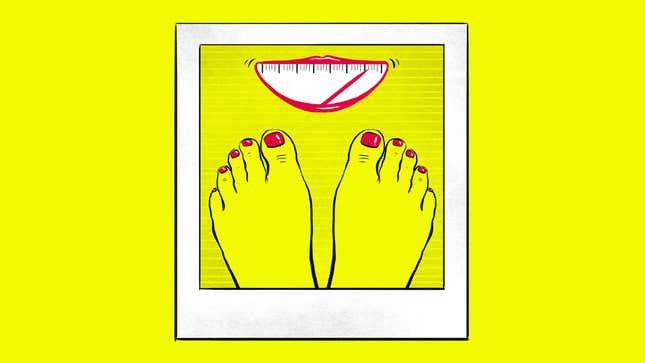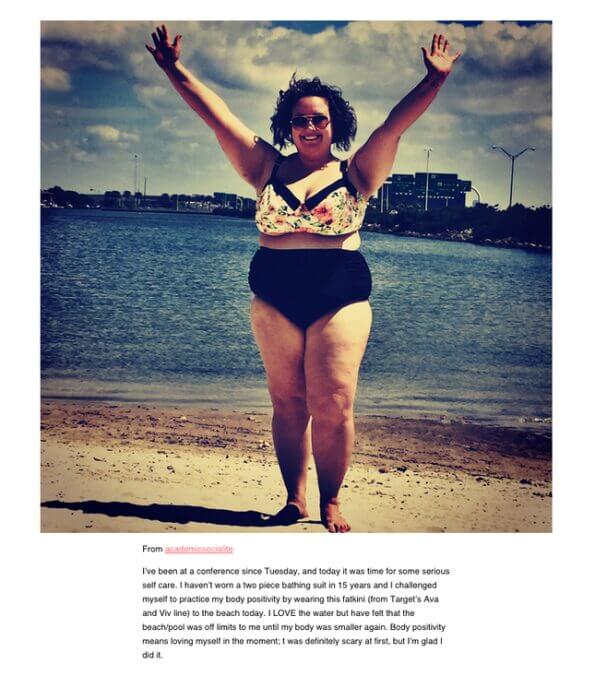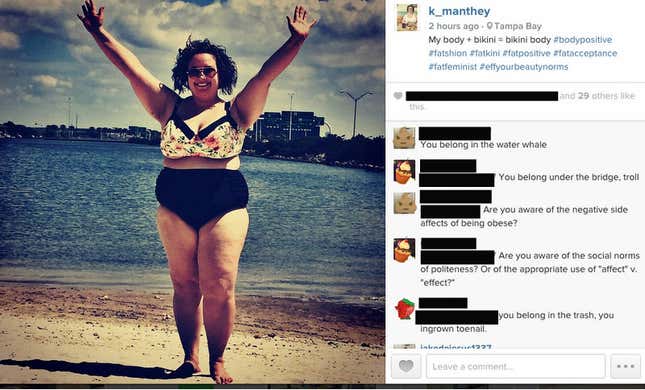What Happens if We Post Pictures of Happy Fat People on the Internet?
In Depth

In March 2015, Liz Boltz Ranfeld asked the question “What Happens If We Let Fat People Be Happy?” Her piece, published in Everyday Feminism, posits, “typically, stories about weight and happiness tend to be rooted in fat women losing weight, or perhaps thin women realizing they need to stop thinking of themselves as fat, or women who are just a little fat embracing that about themselves. Radical statements of body love from fat women are rare.”
And she’s right.
As a self-identified fat woman, I would like to offer a statement of body love here, and discuss how, in my experience, the answer to her title about what happens if we let fat people be happy is: someone, somewhere always has to lose their shit.
Here’s my story:
I haven’t worn a two-piece bathing suit in 15 years. Seriously, the last time I did, I was 16. I’ve been on a body positive journey for the last few years, though, and I recently dared myself to try it again. I’m 31 now, and 246 pounds. I also moderate the activist site Dress Profesh, which advocates for people to push at traditional dress codes. The people that submit to Dress Profesh as brave enough to put their bodies on the internet, and it seemed to me like I should really practice what I’ve been preaching. I’ve gradually shown more skin over the years—I went from wearing long pants and a cardigan in the summer to shorts and dresses, and recently to sleeveless tops.
But the bikini, though? That’s a whole different animal. I mean, it’s basically wearing nylon underwear in public.
I was thrilled last year when the “fatkini” made it’s grand debut. The high-waisted bottoms are super flattering on round bellies like mine, and the ability to mix and match pieces was very appealing. They stayed out of my price range (and comfort zone) though, until this year, when Target made a line of them through Ava and Viv.
In March I went to Florida for an academic conference, and before I left I told myself that I was going to finally do this—I was going to wear a bikini to the beach and fully embrace the body positivity that I espouse. Everyone does this differently, but for me, it’s been about gradually pushing my comfort zone, and this seemed like the most extreme thing to do.
When I went shopping, I actually bought two different tops—a tankini top and a bikini top. I figured if I wimped out on wearing the bikini top, I had a good back up plan. I wore the tankini top with the high waisted bottoms first. The conference hotel had a rooftop pool (yeah, I know, I have a super tough life) and some colleagues and I decided to spend an afternoon up there. Since there were likely going to be other people from the conference, I went with the more conservative of the two swimsuits.
Nothing happened.
Well, not nothing. I laid out in the sun and soaked up both the vitamin D and the confidence that this was something I was able to do. It might not look very radical to the strangers at the pool that day, but this was a big moment for me.
Bolstered by this successful bout of nothing, I decided to give the bikini top a try before I left. A friend and I went to a small beach and I unveiled myself.
And again, nothing happened.
Well, not nothing. I felt so exhilarated by the experience that I put a picture of myself on my website, Dress Profesh. I wrote a caption about how the beach day was “work” because it was a form of self-care during a pretty intense conference experience.

I cross-posted the image to Instagram.
And nothing happened.
Well, not nothing. The love on Instagram started rolling in: lots of likes and comments. I felt empowered—and realized that by feeling empowered in my tankini, I felt empowered in my fatkini, and because of that I felt empowered enough to share my body in a fatkini with the internet.
And then something happened.
In body positive communities it’s not uncommon to get comments from people who are angry—angry with the images of people being happy in their bodies, angry with the idea of body positivity and all of its expressions. We call them trolls. I had heard about this—the virtual equivalent of being catcalled or harassed on the street—but up until this point no person (that I didn’t know) had ever thought to actually tell me to me in a public space that I was gross.

In a way, I was sort of numb when it happened—I mean, could this guy really be serious? How immature is it to be openly rude to people you don’t know in a (semi) public setting? What if someday we meet in real life? What if I’m his English professor next semester? Micro-aggressions around appearance happen every day—but this guy is now documented for all time on my computer, calling me a whale.
Of course, after the numb feeling went away I was hurt, and then I was angry. Really angry. I did some sleuthing and found that my troll had also commented on other body positive posts that used some of the same hashtags. I will never know why this person acted out. The only thing that I have control over is how I feel about the situation—and, after some conversations with folks in my body positive community (and a nice dessert—I’m not going to let the little fucker win), I ultimately came back to feeling pretty good about the whole event. But that voice of the troll stays in my head—this is the “other side” the “outside world” that body positivity exists in relation to. It’s important to acknowledge, but it’s also important to intervene.
So, I’m offering my “radical statement of body love.” It ends with this:
People are always going to judge other people based on appearance. But we don’t know anything about the person we are looking at unless we talk to them (or read about them, in this case). In my academic work I call this “ethical reading”—the idea that we “read” bodies subconsciously, and have to acknowledge that the only thing we know when we look at someone is what our own biases are: fat people are unhealthy and lazy; young black men are dangerous “thugs”; women with crying babies in public are bad moms. People who know me saw my Instagram picture in the context of my journey to body positivity. Someone who didn’t know me saw my Instagram picture and assumed that I didn’t care about my health. I can tell my story as many times, in as many places as I possibly can, but ultimately we need to read bodies ethically.
Illustration by Tara Jacoby.
Katie Manthey moderates Dress Profesh, an online gallery that works to smash racist, sexist, abelist and sizeist notions of dress codes.